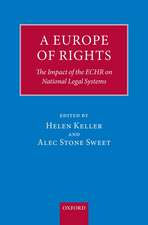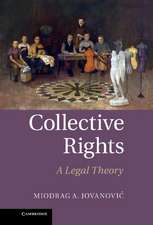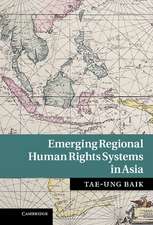The Judicial Response to Police Killings in Latin America: Inequality and the Rule of Law
Autor Daniel M. Brinksen Limba Engleză Paperback – 18 iul 2012
| Toate formatele și edițiile | Preț | Express |
|---|---|---|
| Paperback (1) | 287.48 lei 6-8 săpt. | |
| Cambridge University Press – 18 iul 2012 | 287.48 lei 6-8 săpt. | |
| Hardback (1) | 556.13 lei 6-8 săpt. | |
| Cambridge University Press – 21 oct 2007 | 556.13 lei 6-8 săpt. |
Preț: 287.48 lei
Nou
Puncte Express: 431
Preț estimativ în valută:
55.01€ • 59.94$ • 46.35£
55.01€ • 59.94$ • 46.35£
Carte tipărită la comandă
Livrare economică 24 aprilie-08 mai
Preluare comenzi: 021 569.72.76
Specificații
ISBN-13: 9781107405097
ISBN-10: 1107405092
Pagini: 302
Dimensiuni: 152 x 229 x 17 mm
Greutate: 0.45 kg
Editura: Cambridge University Press
Colecția Cambridge University Press
Locul publicării:New York, United States
ISBN-10: 1107405092
Pagini: 302
Dimensiuni: 152 x 229 x 17 mm
Greutate: 0.45 kg
Editura: Cambridge University Press
Colecția Cambridge University Press
Locul publicării:New York, United States
Cuprins
1. Effectiveness and inequality in the legal system; 2. Charting injustice in Argentina, Brazil, and Uruguay; 3. Informational and normative shifts across jurisdictions; 4. Buenos Aires - political interference and informational dependence; 5. Sao Paolo - normative autonomy and informational failures; 6. Uruguay - strong results from a weak system; 7. Cordoba - high levels of inequality in a strong system; 8. Salvador da Bahia - social cleansing under political and judicial indifference; 9. Binding leviathan.
Recenzii
'Daniel M. Brinks's The Judicial Response to Police Killings in Latin America represents an important contribution to the growing literature on the rule of law in nascent democracies. … Brinks's skillful use of in-depth case studies is impressive. … Brinks argues convincingly that any legal system is a reflection of deeply rooted social hierarchies. … Brinks's innovative use of the notion of 'legal tolls' is particularly compelling. … Brinks's book is a welcome contribution to our understanding of the impact of social marginalisation on the rule of law. … The book's scope makes it a valuable addition to the scholarship on the rule of law not only in Latin American but across the developing world.' The Review of Politics
' … an innovative study that draws on both socio-legal studies and comparative politics and combines quantitative and qualitative analysis. It represents a highly significant contribution to the growing body of literature on democracy and the rule of law in Latin America.' Journal of Latin American Studies
' … an innovative study that draws on both socio-legal studies and comparative politics and combines quantitative and qualitative analysis. It represents a highly significant contribution to the growing body of literature on democracy and the rule of law in Latin America.' Journal of Latin American Studies
Descriere
This book examines the effect of social inequality, political influence and institutional design on the effectiveness of Latin American legal systems.
















